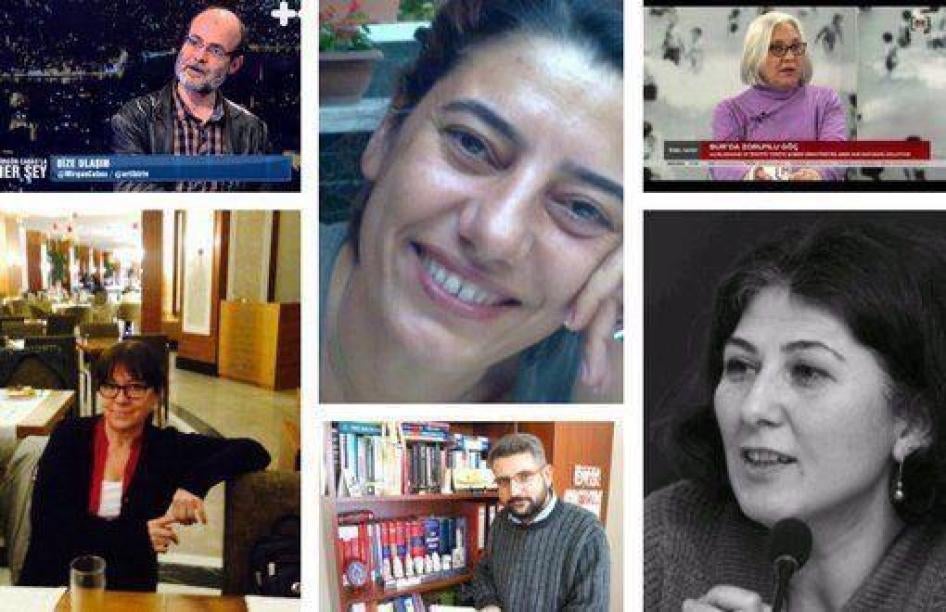The six jailed by the Istanbul court pending trial include the director of Amnesty International Turkey and two foreign nationals. The court released four activists on bail, conditional on signing in at a police station three times a week and with a ban on overseas travel.
'It's outrageous that a Turkish court jailed six human rights activists in a politically motivated effort to silence their work defending the rights of ordinary people,' said Hugh Williamson, Europe and Central Asia director at Human Rights Watch. 'After a smear campaign by pro-government media and harsh comments by President Erdoğan the court accepted the prosecutor's case of aiding a terrorist organization without a shred of evidence against them. This ruling is a profound injustice.'
The six remanded to custody are: Özlem Dalkıran (Citizens' Assembly); İdil Eser (Amnesty International Turkey director); Veli Acu (Human Rights Agenda Association); lawyer Günal Kurşun (Human Rights Agenda Association); Şeymus Özbekli (Rights Initiative); Nejat Taştan (Equal Rights Watch Association); Ali Gharavi (information security consultant, a Swedish national); and Peter Steudtner (well-being trainer and facilitator, a German national).
The four released on bail are: lawyer Nalan Erkem (Citizens' Assembly); İlknur Üstün (Women's Coalition); Şeymus Özbekli (Rights Initiative); and Nejat Taştan (Association for Monitoring Equal Rights);
All 10 spent 12 days in police custody following their detention at a workshop in Istanbul on July 5, 2017, on alleged suspicion of membership of a terrorist organization.
The prosecutor later modified the charge to aiding a terrorist organization, referring to the Fethullahist Terrorist Organization (the term the government uses to describe followers of the exiled cleric Fetullah Gülen), the armed Kurdistan Workers' Party, and another outlawed armed revolutionary group.
During their police custody, media close to the Turkish government ran a relentless campaign vilifying the activists as terrorists and spies. The media falsely represented the legitimate human rights workshop they were attending as a meeting of conspirators. The workshop was about human rights work and information security for defenders in harsh times. President Recep Tayyip Erdoğan suggested there were intelligence reports that the 10 were involved in coup plotting, and made other disparaging comments about them on two other occasions during their police custody.
The detention of the 10 came less than a month after the arrest of Taner Kılıç a human rights lawyer and chair of Amnesty International Turkey, on June 6. Kılıç is in pretrial detention pending the completion of a criminal investigation over alleged membership of a terrorist group.
The prosecutor alleges that the security workshop was all about hiding information on cell phones and laptops from state authorities. The prosecutor cited the existence of emails not written by any of the 10, and phone calls by some of them to individuals alleged to have the encrypted communication application ByLock on their phones as evidence of alleged criminal activity. The government accuses Gulenists of having used the app and treats its mere possession as grounds for criminal investigation.
The so-called evidence also consists of the fact that one defender made telephone calls to an individual later detained, as well as documents and publications found on the defenders' computers. The evidence against the two foreign defenders consists of digital training materials and a map used at the workshop. The prosecutor provided no explanation of how any of the alleged evidence was used to commit crimes or with criminal intent or amounted to a crime. Despite this, the prosecutor stated that an investigation into 'the suspects' activities to finance terrorism and to spy' will continue.
'The prosecutor has produced no evidence of criminal activity by the 10 human rights defenders and yet continues with a bogus, politically motivated investigation,' Williamson said. 'This has nothing to do with justice: it's a pretext for crushing legitimate human rights work in Turkey. The court, which should be upholding rights and the rule of law, was willing to go along with this charade, making this another shameful day for Turkey's judiciary.'








